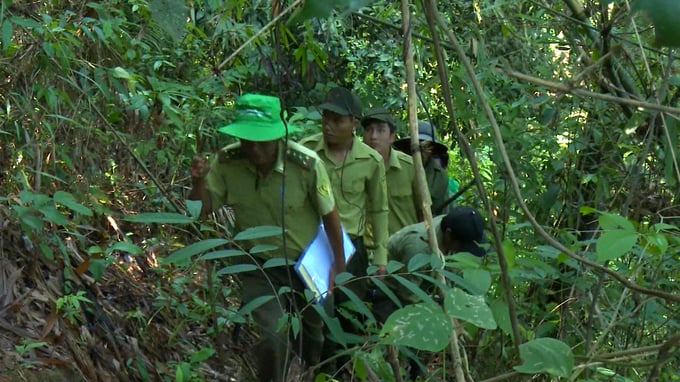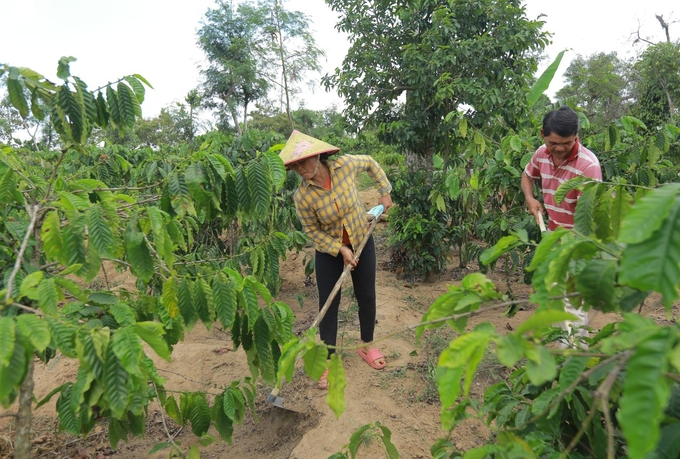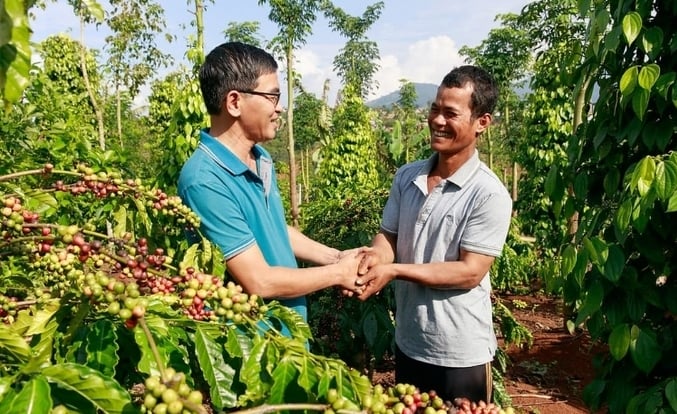June 17, 2025 | 20:53 GMT +7
June 17, 2025 | 20:53 GMT +7
Hotline: 0913.378.918
June 17, 2025 | 20:53 GMT +7
Hotline: 0913.378.918

The ranger went to the field to determine the GPS coordinates for the database.
To develop the 7 sectors of palm oil, soybeans, timber, cattle, cocoa, coffee, rubber, and products derived from this group in compliance with the European Union No Deforestation Regulation (EUDR) ), from mid-2022, the Ministry of Agriculture and Rural Development has coordinated with the United Nations Development Program (UNDP) to launch the project "Comprehensive sustainable landscape management through a site-based approach to sustainable development without loss of forest resources in Lam Dong and Dak Nong" (iLandscape project).
Implemented in 4 years from 2022 to 2026, the iLandscape project aims to have 25,000 hectares of natural forests protected by 2026, reducing emissions equivalent to about 3 million tons of carbon dioxide while improving livelihoods for 35% of the population in the project area, especially ethnic minorities and women.
With a total budget of 5 million euros, the EU funded the project through UNDP in Vietnam. In addition, four international organizations provided technical assistance to the project: the International Center for Tropical Agriculture (CIAT), the European Forestry Institute (EFI), the Sustainable Trade Initiative (IDH), and the United Nations Environment Program (UNEP).
The iLandscape project consists of 4 components, which focus on building an effective governance system, including tools, management processes, and integrated land use planning established at district and provincial levels.
Bui Hoa Binh, UNDP Viet Nam official, said that the development and operation of PPIs (public-private partnerships) at the district level is one of the priorities of the iLandscape project. Currently, UNDP has selected 4 districts, including Dak R'lap, Dak G'long (Dak Nong province), and Di Linh, Lac Duong (Lam Dong province) to build and operate 4 district PPIs.
The parties involved in the PPI model include the District People's Committee, relevant provincial agencies, cooperatives, companies producing, processing, trading agricultural products, industry associations, research and development organizations, community organizations, and mass organizations such as farmers' associations, women's unions, etc. in the district.
In parallel with capacity building at the district level, UNDP added a cooperation mechanism through operating a system of indicators to monitor and evaluate the landscape transformation process towards sustainability. That is, develop a set of indicators at the provincial and district levels concerning REDD+, VPA-FLEGT, and even EUDR regulations. In addition, it is necessary to discuss with relevant stakeholders, especially the District People's Committee, to integrate the set of indicators in monitoring the implementation of provincial and district land use planning.

The Central Highlands is the coffee capital of Vietnam, accounting for more than 90% of the country's total area.
The PPI program is a new approach developed by the Sustainable Trade Initiative (IDH) in different geographical areas to balance economic development, social security, and natural resource protection.
The goal for 2025 is that 100% of the area of coffee, vegetables, and flowers produced meet sustainable standards accepted by the market, reduce the use of chemicals and pesticides by 15%, and increase the income of coffee farmers by 15% or more. These are prerequisites for effectively implementing the iLandscape project and EUDR adaptation support activities.
In the EUDR regulations, local parties and businesses must undergo mandatory due diligence before placing goods on the EU market. Specifically, businesses in the supply chain must establish and operate a due diligence system to ensure that only legal and non-forest-related products can be imported into or exported from the EU.
At the same time, strict traceability of goods to each production plot, based on GPS coordinates.
With the current situation of critical commodities in the Central Highlands, such as coffee, rubber, wood, etc., GPS traceability is a concern. Mr. Pham Tuan Anh, Director of Dak Nong Department of Agriculture and Rural Development, said that the province's coffee area is large (about 140,000ha), but small-scale production is still relatively large. Therefore, Dak Nong has no database for each plot or plot.
The advantage of Dak Nong is that the Provincial People's Committee has directed the entire agricultural sector to focus on implementing the digital transformation project of the agricultural industry. Along with the coffee area, most of the coffee areas have been planted stably for many years; forest areas that have been put into strict management, especially for areas with deforestation origin since December 31, 2020, have been put into management and forest restoration.

Capacity building at the district level helps farmers to have easier and earlier access to market information.
On that basis, IDH proposed to build a planting area information system. Based on the current status of data, the forest map according to the classification of 3 forest types, Dak Nong, Lam Dong, and the Central Highlands provinces subject to the EUDR's regulation, will update the forest boundaries according to December 31, 2020 status, clearly identify areas that are quickly affected and vulnerable by agricultural production. In addition, it converts forest data and maps into a suitable mapping system for businesses to access and use easily.
Regarding data, IDH proposed a plan to convert cadastral map data into KMZ map with the following information: Garden code - Coordinates (GPS) - Boundary - Area - Owner/owner - Type land by purpose of use - Group of crops.
In addition, for growing areas that do not have a database, UNDP and IDH are committed to allocating resources from projects such as iLandscape or PPI at the district level to update information on planting areas according to each commodity. Time to delineate more planting areas according to 3 levels of low risk, medium risk, and high risk related to forests.
In addition to capacity building measures, IDH proposed that stakeholders develop communication plans, compile and produce communication materials to raise awareness for farmers.
Translated by Tu Quyen

(VAN) The results of national programs are essential for establishing a contemporary livestock sector that is well-equipped to meet the demands of both domestic and international markets, with robust biosafety standards.

(VAN) The UNESCO Global Geopark revalidation of Non nuoc Cao Bang and the transition to a two-tier administrative model are presently undergoing a pivotal moment in Cao Bang, the northernmost province of Vietnam.
/2025/06/13/5330-2-004539_953.jpg)
(VAN) Changing policy mindset and removing investment barriers are urgent requirements to open up new development space for enterprises in the agricultural sector.

(VAN) The areas include the restoration of five million hectares of marine ecosystems.

(VAN) Dr. Le Van Nguyen, Director of the Institute of E-Commerce Management (ECM), emphasizes the potential for green development through the cultivation of fruit trees, particularly in provinces such as Son La.

(VAN) VAAS and numerous Vietnamese enterprises have signed cooperation agreements with Japanese partners to promote agricultural technology and trade connectivity.
/2025/05/29/5625-12-214801_567.jpg)
(VAN) Provincial mergers in the Mekong Delta promise to streamline administration, expand inter-provincial raw material areas, and foster close linkages in agricultural value chains, benefiting both businesses and cooperatives.